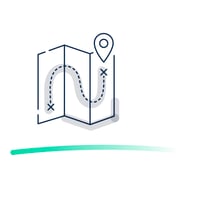Nagarro, over the last ten years, has succeeded in many gaming-related projects. Today, much like you, we face a different market that is far more mature, consolidated, and regulated. Today we have a smarter market, and data has become critical for analyzing gaming behaviors, player responsibility, and knowing which games work where.
This article will dive deep into what is on everyone's lips within the industry and look at the subject from a more technical viewpoint. Further, we will talk about the major regulatory changes in some of the states in the North American region and how we at Nagarro play a large part in helping enterprises with the technical responsibility they need in the gaming industry.
Conquering new horizons in Gaming: Compliance, geo-fencing, and real-world testing
When one of Europe's largest gaming operators is expanding across the Atlantic, there are many things to consider. Not just the obvious things, such as regulatory aspects and localization, you also need to consider telecommunications infrastructure, payment providers, mobile device types, etc. Most of these come with dependencies that are not within your control.
Still, your product needs to work well - and it needs to be compliant!
That means focusing on your usual test coverage and an entirely new set of regulatory requirements on top of that. And regional regulations mean that you must ensure that your app works when crossing thousands of miles between state geographies.
Sounds like a Herculean task, right? Well, we've successfully done this in one of our most challenging but fun projects! And because we care, we share - in this case- our experiences in ensuring quality for one of our key customers in the gaming space.
 DYH - Do your homework
DYH - Do your homework
So, what does "regulatory" mean in the gaming context? How is it different from our usual test approach? Once you look at the regulations and the features in your app, you'll find quite a strong relation between specific use cases and processes and less of a correlation in others. As usual, the devil is in the detail, but you have to start somewhere, right?
Part of this is processing it like a checklist:
- KYC (Know Your Customer) processes implemented and working? Check.
- Behavior for crossing a state border implemented and working? Check.
And so on.
This is the easy part, breaking it down, re-using your typical functional tests, and ensuring compliance is covered across the board. So that you cross every “t” and dot every ”I,” which means there is quite a bit of understanding and working.
Then there is the technical side, which might not be strictly relevant for regulatory compliance, but it can make or break the success of your launch.
Which devices do you test your system on? That means research into the usage statistics of the target region. Which telecommunications providers and payment platforms need to be tested?
Also, things like detection of crossed borders geolocation mean understanding not only the topography of your target region but also its population density and border crossing points.
A good battle plan is key.
.jpg?width=200&name=02_Be%20smart%20and%20fake%20it%20(till%20you%20make%20it).jpg) Be smart and fake it ('till you make it)
Be smart and fake it ('till you make it)
Now, this, at first, sounds like a logistical nightmare, with a large team on the ground in your target region, busy testing every possible variant. And if you take these things at face value, it can be.
But we took a different approach. Analyzing the target test portfolio, we developed an approach (a rather smart one, if we may say so) to decide what needed to be tested on-site and what could safely be tested remotely. This enabled us to work in a larger, distributed team without the logistics headache and cost associated with on-site testing.
But how to perform this type of testing remotely? That is where the tech comes in. Device platforms and simulating geolocation, regulatory data, and interfaces enabled us to execute the relevant test portfolios a lot faster and test constellations that were pretty much impossible to test in real life.
Along the way, we made sure to mark those tests necessary to be done on-site.
 Location, location, location
Location, location, location
At this point, we knew the system well and made sure everything worked the way it should. But still, we had to prove things worked in a compliant way in a real-world setting. And that means going on-site.
With the launch date looming ever closer, we needed an efficient setup to complete the required testing in time.
In our case, there were two aspects to it:
Testing in a local real-world setting, with real devices, real networks, real data
Making sure geolocation was behaving as expected
 End-to-end is not enough
End-to-end is not enough
Getting as close to the productive setting as possible was important for the first point. This means we needed a local Social Security Number and payment card and a representative set of devices with local network providers.
One part of the team hunkered down with a stack of devices and SIM cards and tested various combinations. All the while, they were connected to the development team, remote test team, and admins to ensure they had everything to execute the required tests efficiently.
 Road trip!
Road trip!
The second point means identifying key points along the state's border and crossing them at strategic points to make sure your app behaves as expected. Different states have different regulations, and what's even more important: your licenses only extend to certain states. So, you need to make sure your users are informed of the availability of your services and their associated regulatory aspects within a couple of hundred meters from the border.
It means driving for long periods, executing your default tests, crossing the border, testing again, crossing back, testing again, then back to driving again. Sleep at a motel. Rinse and repeat for a couple of days until you've tested all strategic points.
 In closing: Be agile
In closing: Be agile
If that sounded like a complex project to you, you're right. It was. And even more, with many different parties participating in that launch, things shifted around. Systems were unavailable, delivery dates got pushed, and payment integration did not progress as planned.
This is where Nagarro's global presence helped us tremendously - we set up a small but excellent local team and covered all these aspects in just a couple of weeks, locally testing an already well-tested system with an experienced remote team having their backs.
In the holiday season, no less. Go team!
Today, we look back at that project as one of the most challenging but also diverse and fun projects we've experienced. And we're proud to report that the story is not over: our customer was delighted with our agile approach, and the success of this launch in the US has led, among other things, to even more expansion plans - Canada, you're next!






